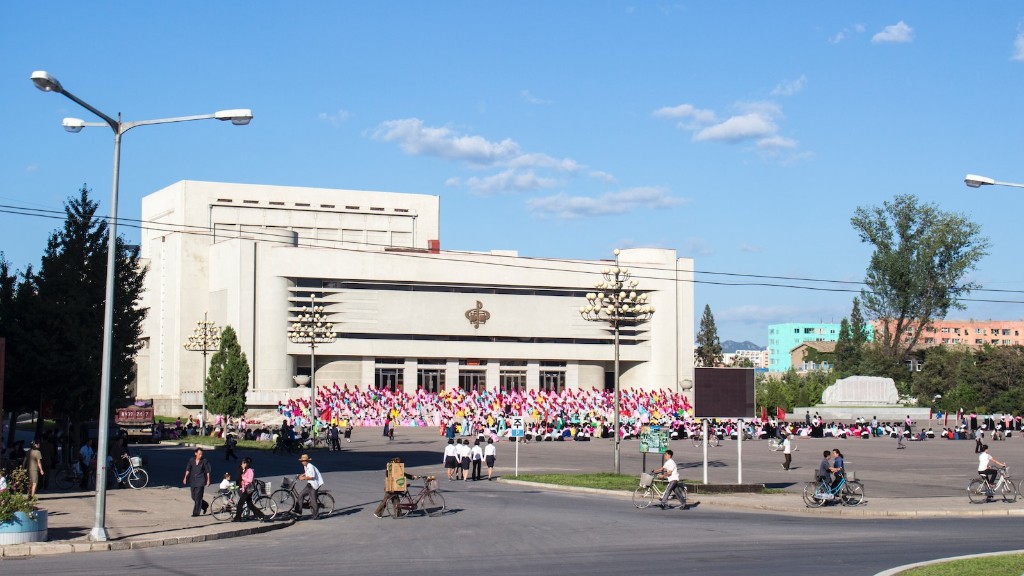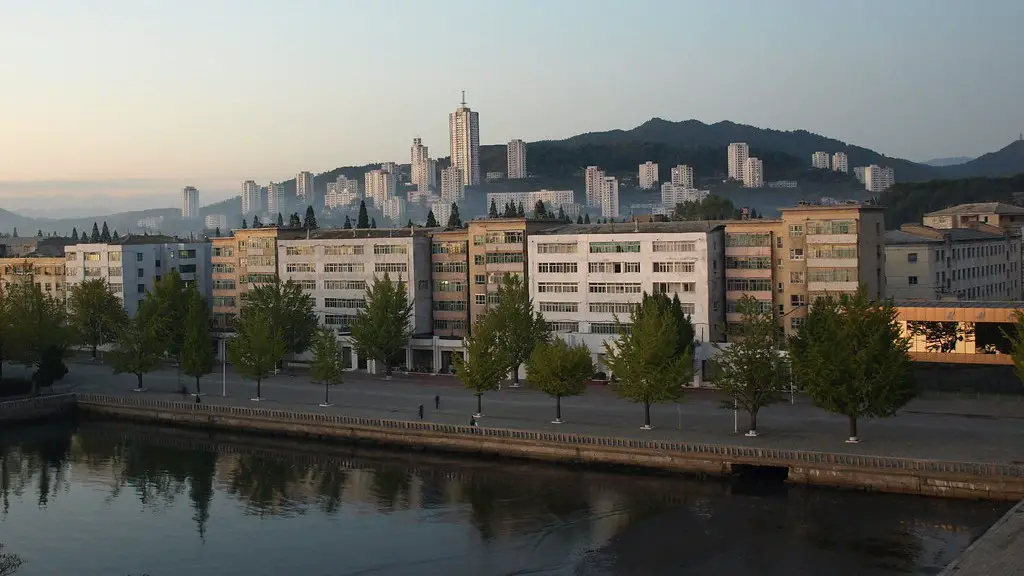Why Is North Korea Communist
Since its formation in 1948, North Korea has been a single-party state governed by the Korean Workers’ Party (KWP). North Korea was originally an independent, nationalist state, but after the end of the Second World War, the Soviet Union began supporting the Communist-leaning regime of Kim Il-sung. This support enabled the North Korean Communist party to seize power and transform the country into a Stalinist regime in the 1950s.
North Korea’s adoption of Stalinist Communism has been attributed largely to the strong support it received from the Soviet Union, who provided economic aid in exchange for North Korea’s alignment with its own agenda. This alliance was cemented in 1950, when North Korea and the USSR signed the Sino-Korean Treaty, which declared North Korea a sovereign People’s Republic with a Marxist-Leninist system of government.
The North Korean regime under Kim Il-sung maintained a tight grip on power, establishing what has been characterised as a totalitarian regime where criticism of the state was heavily suppressed. The Juche ideology, founded by Kim Il-sung in 1950s, promoted self-reliance and the importance of state control in all aspects of life; this ideology and North Korea’s iron-fisted rule has become a defining feature of its government.
North Korea’s Communist identity can also be attributed to the legacy of the Korean War (1950-1953). The war resulted in a stalemate, leading to the establishment of a heavily militarised Demilitarized Zone (DMZ) between the North and South of the Korean peninsula. This division marked the formal beginning of the Cold War and transformed North Korea into a Communist bulwark against the forces of capitalism, with the war formally ending in 1953 with the signing of an armistice.
This legacy of division, combined with the heavily insulated nature of North Korean society, has contributed to the regime’s adherence to socialism and its firm commitment to Kim Il-sung’s ideals. To this day, the North Korean Communist party remains in power and exerts almost total control over North Korean citizens, with its leaders controlling the media, education system and economy.
According to North Korean defectors, the North Korean government maintains its control by instilling a deep sense of fear among its citizens. Through a harsh propaganda system, as well as its political prison camps, the regime has managed to keep its citizens docile and focused on their loyalty to the regime and obedience to authority.
Under the present leadership of Kim Jong-un, North Korea remains committed to its Communist principles. Despite attempts to liberalise its economy, Kim Jong-un’s regime continues to maintain its tight control over all aspects of government and society, ensuring that North Korea remains a loyal Communist state.
The Effects of North Korea’s Communism
The Communist nature of North Korea’s government has had a profound effect on its society and economy. The North Korean economy is heavily centralised and managed by the state, resulting in a low rate of economic development, an inadequate healthcare system and an extremely high level of poverty. North Korean citizens have very limited civil rights, while the government maintains strict control over its citizens’ access to information and travel.
The North Korean government has also been heavily criticised for its human rights record. Many North Korean citizens have been reported subjected to arbitrary detention, torture and other forms of mistreatment. In particular, North Korea has been accused of widespread human rights abuses against its own citizens, including the use of forced labour.
The Communist ideology at the heart of North Korea’s government has also meant that the country has become increasingly isolated from the rest of the world. Other than the countries of the former Soviet Union, North Korea has few bilateral diplomatic relations with foreign countries. As such, it has become largely reliant on aid from China and the United Nations for its economic and social development.
The origins and effects of North Korea’s Communism—and the Kim Dynasty’s use of it to maintain power—remain complex and largely misunderstood by the outside world. Although the situation in North Korea has improved in the last decade, it is clear that the Communist ideology of North Korea is still very much alive and will likely remain so for the foreseeable future.
US-North Korea Nuclear Relations
The Communist ideology of North Korea has had a profoundly destabilising effect on international politics, particularly its relationship with the United States. North Korea has been in a state of constant tension with the US since the Korean War and has refused to yield to US demands regarding its nuclear programme. North Korea has refused to comply with international non-proliferation efforts and has conducted a number of nuclear weapons and ballistic missile tests, leading to increasingly harsh economic sanctions from the US.
The situation between the US and North Korea has become increasingly tense in recent years, with both sides accusing each other of aggressive rhetoric and taking increasingly provocative steps. However, recent attempts by North Korean leaders to engage in dialogue with the US have raised the prospect of a peaceful resolution to the nuclear dispute, although this remains to be seen.
The US’s relationship with North Korea is particularly problematic due to the Communist nature of North Korea’s government. North Korea’s refusal to bend to US demands and its commitment to Stalinism have meant that the US has had to engage in more subtle measures of diplomatically resolving the nuclear dispute. The Trump administration has implemented various tactics to resolve the crisis, with varying degrees of success.
Despite recent progress, the nuclear dispute between the US and North Korea remains unresolved and the future of the relationship between these two countries remains uncertain. However, it is clear that North Korea’s Communist ideology is an important factor in the perpetuation of this dispute and will be difficult to overcome.
Impact On North-South Korea Relations
The Communist ideology of North Korea has also had a strong effect on relations between North and South Korea, with the two countries remaining in a state of confrontation since the Korean War. North Korea’s adherence to Stalinism has ensured that relations between the two countries remain strained, while North Korea’s nuclear weapons programme has caused unease in the South.
North Korea’s insistence on the reunification of the Korean peninsula under its own terms—with the establishment of a ‘Socialist Confederation’—has remained a key impediment to reconciliation between the two countries, with South Korea steadfastly refusing to compromise on its democratic principles. However, recent attempts by North Korean leaders to engage in dialogue with the South have raised hopes of a peaceful resolution to the dispute.
The reunification of the Korean peninsula remains an elusive goal, and it remains difficult to envision a scenario where North and South Korea can peacefully reconcile their differences and form a unified nation. While there have been recent attempts to bring the two sides together, it is clear that North Korea’s Communist ideology remains the biggest hindrance to the reunification of Korea.
China-North Korea Relations
Since the establishment of Communist rule in North Korea, the country has had a close relationship with China. China has provided North Korea with economic aid and diplomatic support since the 1950s, culminating in a formal alliance in 1961. This alliance is largely viewed as a strategic one, with China providing North Korea with a buffer against US-aligned forces in South Korea.
The relationship between North Korea and China has been frequently tested by North Korea’s provocative actions and its refusal to back down from its nuclear ambitions. In response to these developments, China has imposed economic sanctions on North Korea, as well as diplomatic pressure to return to the negotiating table. However, China’s continued support for the North Korean regime highlights its commitment to maintaining a Communist ally in the region.
China’s support for North Korea is indicative of the wider geopolitical landscape in East Asia, in which China plays a significant role. China’s ongoing commitment to maintaining North Korea as a Communist state is part of its efforts to extend its influence in the region and maintain its strategic advantage. Despite the recent thaw in relations between North and South Korea, it is likely that this partnership will remain a key element in China’s foreign policy towards North Korea.
Conclusion of North Korea’s Communist Ideology
The Communist ideology of North Korea has had a strong and lasting effect on the country’s government and its relationship with the rest of the world. North Korea’s adoption of Communism has enabled it to retain the loyalty of its citizens, while also making it an increasingly isolated and insulated state. North Korea’s Communist ideology has also had a destabilising effect on East Asian geopolitics, with its nuclear ambitions continuing to cause unease in the region.
The future of North Korea’s Communist ideology remains uncertain, with recent attempts by North Korean leaders to engage in dialogue with the US raising the prospect of a peaceful resolution to the nuclear dispute. However, it is clear that North Korea’s steadfast adherence to Communism will remain a major factor in the country’s government and its relationship with the rest of the world for the foreseeable future.





